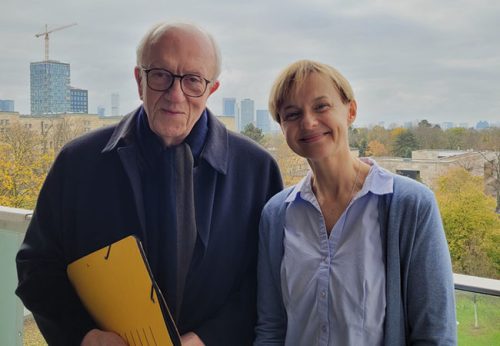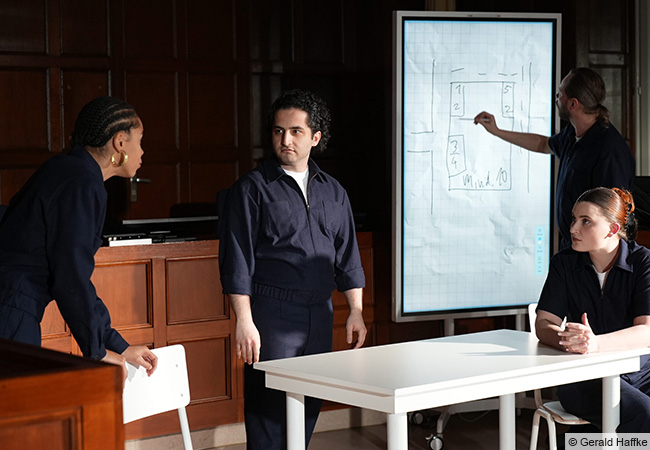Dr. Ute Lewitzka has been appointed Germany’s first professor of suicide studies and suicide prevention. Her appointment at Goethe University Frankfurt took effect on November 1, 2024. One of her main objectives is the systematic recording and analysis of suicides and suicide attempts to derive effective prevention strategies. In her new role, she can draw on the strong network in the field that exists in Frankfurt. One long-term goal is to establish a German Center for Suicide Prevention here. The position is funded by the Crespo Foundation, Henryk Sznap Stiftung, and the Dr. Elmar und Ellis Reiss Stiftung.

More than 10,000 people took their own lives in Germany last year, a figure that is more than three times as great as the number of traffic accident fatalities. The number of attempted suicides is significantly higher, affecting people across all age groups. Suicide studies focus on the factors that lead to suicide and its prevention. This important field is now receiving special attention in Frankfurt, where the first-ever German professorship for suicide studies and suicide prevention has been set up at Goethe University’s Faculty of Medicine.
Dr. Ute Lewitzka, who has been researching and working in this field for more than 25 years and currently serves as chair of the German Society for Suicide Prevention [Deutsche Gesellschaft für Suizidprävention], has been appointed to the position. “I’m very pleased to see suicide studies, which unfortunately still remain a niche topic, gain this level of recognition,” says Lewitzka, who transitions to Frankfurt from Dresden University Hospital, adding that a professorship can help further destigmatize mental illnesses. Her goals include the systematic tracking and analysis of suicide attempts and suicides to further develop effective preventive measures and potentially also implement these at the political level.
The professorship is based at University Hospital Frankfurt’s Department of Psychiatry, Psychosomatic Medicine and Psychotherapy, headed by Prof. Andreas Reif, which has long specialized in treating mood disorders, such as depression. The goal is to establish a German Center for Suicide Prevention in collaboration with the German Foundation for Depression Relief and Suicide Prevention [Stiftung Deutsche Depressionshilfe und Suizidprävention] and the European Alliance against Depression. A well-developed regional network already exists, uniting various stakeholders who drive research and treatment of suicidality and engage in prevention work, including school-based programs. Alongside research, specialist education and training are set to play a central role.
The project has secured funding for the next five years, thanks to the support of Crespo Foundation, Henryk Sznap Stiftung, and Dr. Elmar und Ellis Reiss Stiftung, with the latter contributing the majority of funds. Dr. Elmar Reiss, who set up the foundation with his wife in 2018, explained that the professorship’s goals align closely with the foundation’s mission: “Our main goal in establishing the foundation was to help people with depression and alleviate their suffering. Depression is a condition that can increase suicide risk. Our foundation aims to help those affected find other paths and once again see light at the end of the tunnel.”
Developing effective prevention methods requires an extensive amount of data. As part of a pilot project in Saxony, Lewitzka demonstrated that the prompt recording and evaluation of suicide attempts by specially trained emergency dispatchers enables the creation of “heat maps” that visually represent the locations and frequencies of incidents. Combined with targeted monitoring of the methods used in suicide (and suicide attempts), this approach can prevent many suicides. Frequently chosen methods of self-harm can be regulated — for instance, by controlling access to specific buildings or sites. “Restricting methods is one of the most effective prevention measures,” Lewitzka explains.
Dr. Phyllis Mania
About Prof. Dr. Ute Lewitzka / Born in 1972, Prof. Dr. med. Ute Lewitzka studied medicine in Berlin and Dresden and trained as a specialist in psychiatry and psychotherapy at Dresden’s Carl Gustav Carus University Hospital. Her doctoral thesis in 2004 and her habilitation in 2018 both focused on suicide studies. In 2017, she founded the Werner Felber Institute for Suicide Prevention and Interdisciplinary Research in Healthcare [Werner Felber Institut für Suizidprävention und interdisziplinäre Forschung im Gesundheitswesen], of which she remains the chair. Since 2018, she has also served as volunteer chair of the Deutsche Gesellschaft für Suizidprävention (DGS) and the Suicide Studies Committee of the German Association for Psychiatry, Psychotherapy and Psychosomatics [Deutsche Gesellschaft für Psychiatrie und Psychotherapie, Psychosomatik und Nervenheilkunde, DGPPN].
German Help Resources for Those Affected and Their Families
Frankfurt Suicide Prevention Network (FRANS): https://frans-hilft.de/
Telephone Counseling Service: 1110111, https://www.telefonseelsorge.de/
“Nummer gegen Kummer” (for children and youth): 116111, https://www.nummergegenkummer.de/







